-
Introduction

The Fall: Twenty Years After the Collapse of the U.S.S.R.
Click to start > -
Profiles
-
Timeline
-
1985
-
March 11, 1985
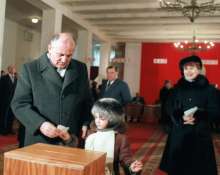
-
March 11, 1985
Mikhail Gorbachev named General Secretary of the Communist Party of the Soviet Union.
-
November 19,1985
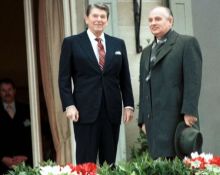
-
1986
-
February 25, 1986
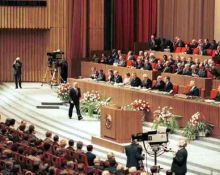
-
April 2, 1986
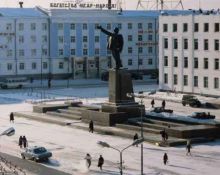
-
April, 1986
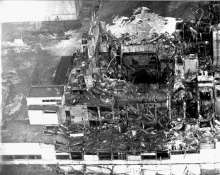
-
April, 1986
Chornobyl disaster.
-
December 16, 1986
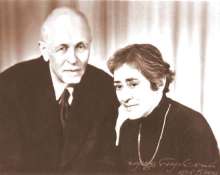
-
December 16, 1986
Andrei Sakharov freed from internal exile and allowed to return to Moscow.
-
December 16-19, 1986
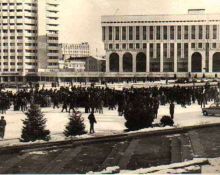
-
1987
-
January 27, 1987
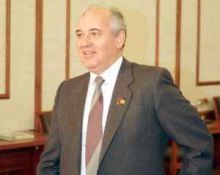
-
June-July, 1987
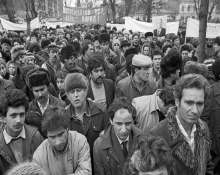
-
October 21, 1987
Moscow Communist Party boss and Politburo member Boris Yeltsin lashes out at Gorbachev over slow pace of reform in Central Committee meeting.
-
November 11, 1987

-
December 8, 1987
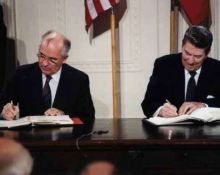
-
1988
-
January 15, 1988
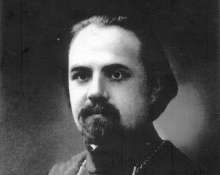
-
February 1988
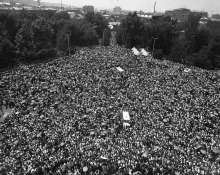
-
March 1988
In response to Nagorno-Karabakh's request, General Secretary Mikhail Gorbachev rules out any changes to the borders between Soviet republics. Moscow announces an aid and investment package for Nagorno-Karabakh.
-
March 13, 1988
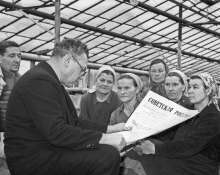
-
March 13, 1988
The "Nina Andreyeva letter" attacking perestroika is published in "Sovetskaya rossia."
-
April 14, 1988

-
June/July 1988
At the 19th CPSU Conference, Gorbachev announces multi-candidate elections to new Soviet legislature, the Congress of Peoples' Deputies.
-
September/October 1988
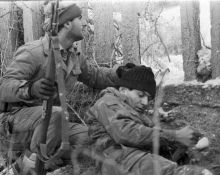
-
December 1988
Karabakh Committee members are arrested and taken to Moscow, where they are held in prison until May 1989.
-
1989
-
January 1989
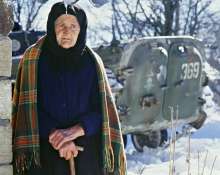
-
February 16, 1989
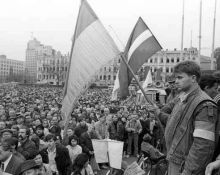
-
March 1989
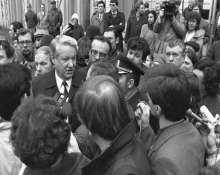
-
March 1989
Semi-competitive elections to Congress of Peoples' Deputies held. Anti-Communist forces perform very well, with Boris Yeltsin, Andrei Sakharov, Anatoly Sobchak, and other reformers and pro-democracy figures winning seats.
-
April 9, 1989
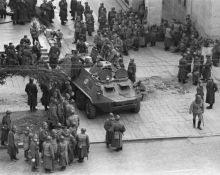
-
May 20, 1989
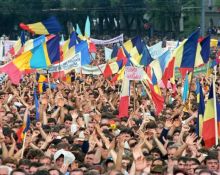
-
May 25-June 9, 1989
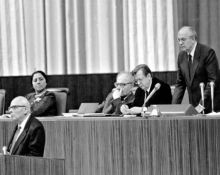
-
June/July 1989

-
August 1989
Azerbaijan imposes railway blockade on Armenia and NKAO. Armenians retaliate by staging labor strikes.
-
August 23, 1989

-
August 23, 1989
Residents of Baltics form 600-kilometer-long human chain to mark the 50th anniversary of Molotov-Ribbentrop pact.
-
August 23, 1989
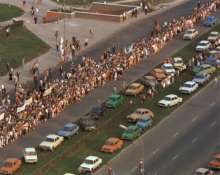
-
August 23, 1989
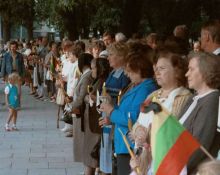
-
August 31, 1989

-
September 8-10, 1989
The Ukrainian Popular Movement for Perestroika (RUKH) holds its founding congress in Kyiv.
-
November 7, 1989
Successful demonstration against traditional military parade in Chisinau dedicated to the October Revolution.
-
November 9, 1989

-
December 2-3, 1989
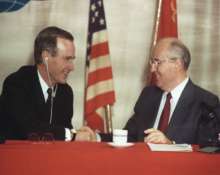
-
December 14, 1989
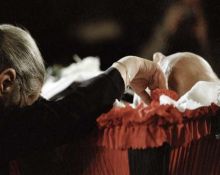
-
1990
-
January 1990
Soviet leadership declares state of emergency in Nagorno-Karabakh and along Armenian-Azerbaijani border.
-
January 1990
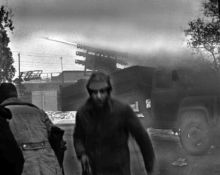
-
January 19–20, 1990
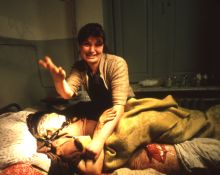
-
January 19–20, 1990
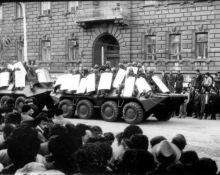
-
January 19–20, 1990
During Black January, the Soviet Army cracks down on independence demonstrators in Baku with estimates of those killed varying between 93 and 300.
-
January 22, 1990
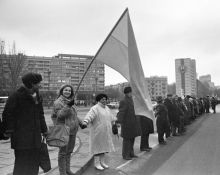
-
January 22, 1990
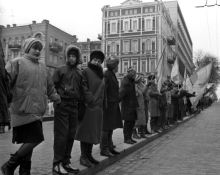
-
February 7, 1990
Central Committee abolishes Article 6 of Soviet Constitution, relinquishing Communist Party's monopoly on power.
-
February 7, 1990
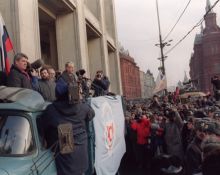
-
February 12, 1990
Bloody riots break out in Tajikistan, killing 28 people. Islamists emerge on the political scene.
-
February 12, 1990

-
February 12, 1990

-
February 12, 1990
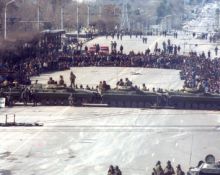
-
February 12, 1990

-
March 11, 1990
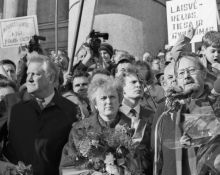
-
March 11, 1990
Lithuania becomes first Soviet republic to declare independence.
-
March 11, 1990
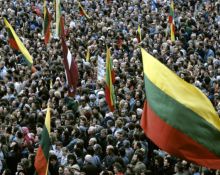
-
March 11, 1990
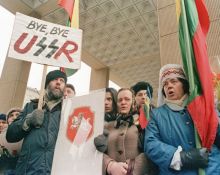
-
March 15, 1990
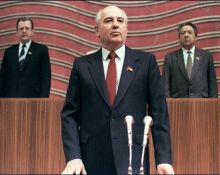
-
March 15, 1990
Mikhail Gorbachev elected president of U.S.S.R. by Congress of Peoples' Deputies.
-
May 4, 1990
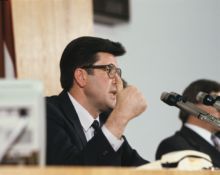
-
June 12, 1990
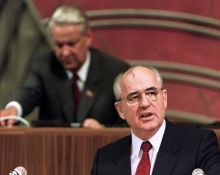
-
June 23 1990
Moldovan SSR declares sovereignty from the U.S.S.R.
-
July 1-11, 1990

-
July 1-11, 1990
Gorbachev is reelected General Secretary at 28th, and final, Communist Party Congress.
-
July 15-16, 1990
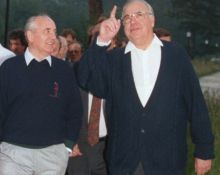
-
July 16, 1990
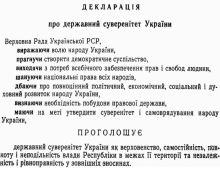
-
July 16, 1990
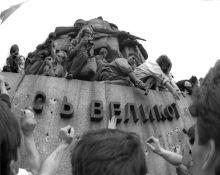
-
July 24, 1990

-
July 27, 1990
Belarus declares sovereignty.
-
August 19, 1990
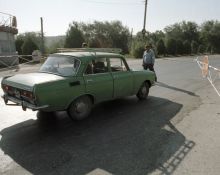
-
August 23, 1990
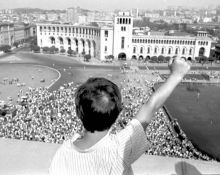
-
August 30, 1990
Tatarstan Supreme Council adopts declaration of sovereignty, claiming the supremacy of its own laws and demanding equal (separately from Russia) participation in a new union treaty.
-
September 2, 1990
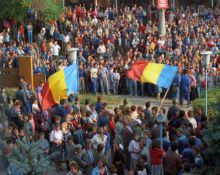
-
October 2-17, 1990
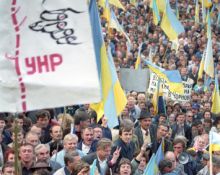
-
October 2-17, 1990
Student hunger strike in Kyiv. Students from all over Ukraine stage a hunger strike against the signing of a new union treaty, demanding the nationalization of the Communist Party and Komsomol property, early multiparty elections to the Supreme Soviet, and the resignation of Ukraine's Prime Minister Vitaliy Masol. On October 17, Masol resigns and the hunger strike ends.
-
October 25, 1990
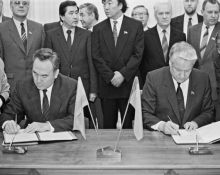
-
October 27, 1990
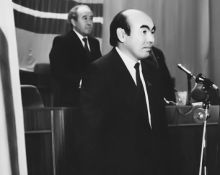
-
November 23-25, 1990

-
November 27, 1990
The Supreme Soviet of the Chechen-Ingush ASSR , imitating the sovereignty declaration of the Russian Federation, declares the Chechen-Ingush Republic a "sovereign state."
-
December 15, 1990
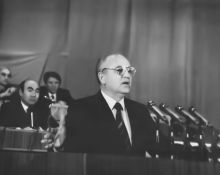
-
1991
-
January 11-13, 1991
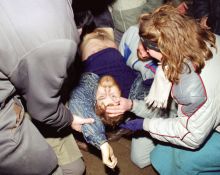
-
January 13-20, 1991
Communist forces attempt coup against democratic forces in Lithuania and Latvia.
-
January 13-20, 1991
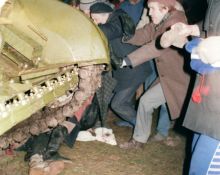
-
January 13-20, 1991
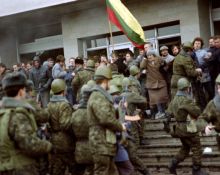
-
March 1991
Referendum on Gorbachev's proposed new union treaty for the U.S.S.R. passes.
-
March 1991
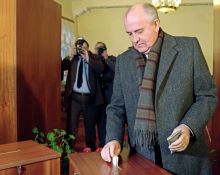
-
March 1991

-
April 9, 1991
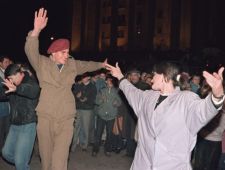
-
May/June 1991
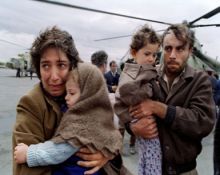
-
August 19-21, 1991
Hard-line coup against Gorbachev fails.
-
August 19-21, 1991
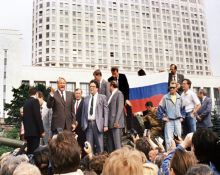
-
August 19-21, 1991
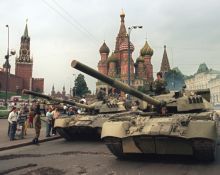
-
August 19-21, 1991
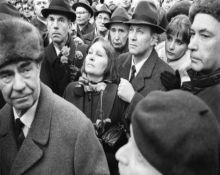
-
August 19, 1991

-
August 20, 1991
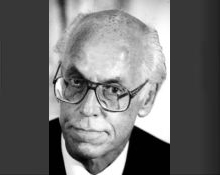
-
August 23, 1991
Moldova bans Communist Party.
-
August 24, 1991
Ukraine declares independence.
-
August 24, 1991
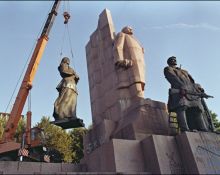
-
August 25, 1991
Belarus declares independence.
-
August 27, 1991
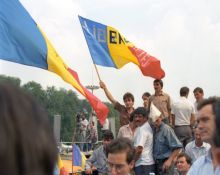
-
August 31, 1991
Uzbekistan declares independence. Kyrgyzstan declares independence.
-
September 2, 1991
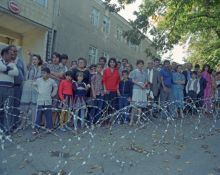
-
September 6, 1991
The armed wing of the Chechen Congress storms a meeting of the Chechen-Ingush Supreme Soviet and forces its chairman, Doku Zavgayev, to abdicate.
-
September 9, 1991
Tajikistan declares independence.
-
September 9, 1991
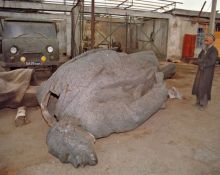
-
October 18, 1991
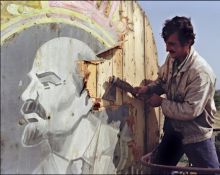
-
October 26, 1991
Independence referendum overwhelmingly passes in Turkmenistan.
-
October 27, 1991
Turkmenistan declares independence.
-
November 1991
Azerbaijan's Supreme Soviet annuls the autonomous status of Nagorno-Karabakh. The region's parliament responds by holding a referendum in which Karabakh Armenians vote overwhelmingly in favor of secession from Azerbaijan.
-
November 6, 1991
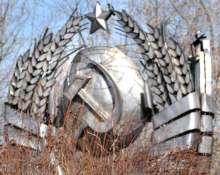
-
November 7, 1991
Yeltsin declares a state of emergency in Chechnya, orders Dudayev's arrest, and prepares to subdue Chechnya by force.
-
November 9, 1991
Russian troops from the Interior Ministry fly into Khankala Airport in Grozny. They are blockaded by a newly established Chechen national guard, while a huge mass meeting in Freedom Square in Grozny rallies around the Dudayev government.
-
November 9, 1991
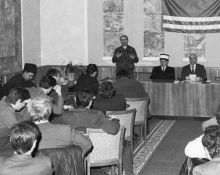
-
November 24, 1991
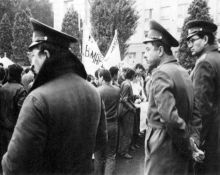
-
December 1, 1991
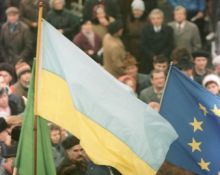
-
December 8, 1991
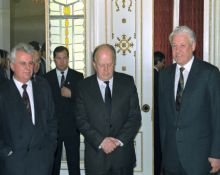
-
December 16, 1991
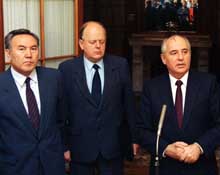
-
December 25, 1991
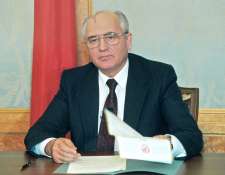
This is the main content area for timelne. Close me -
-
Maps


Like it? Share